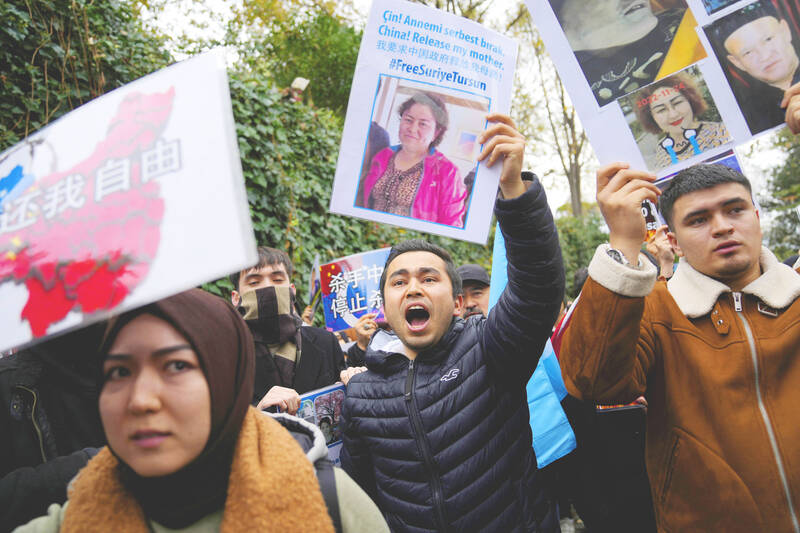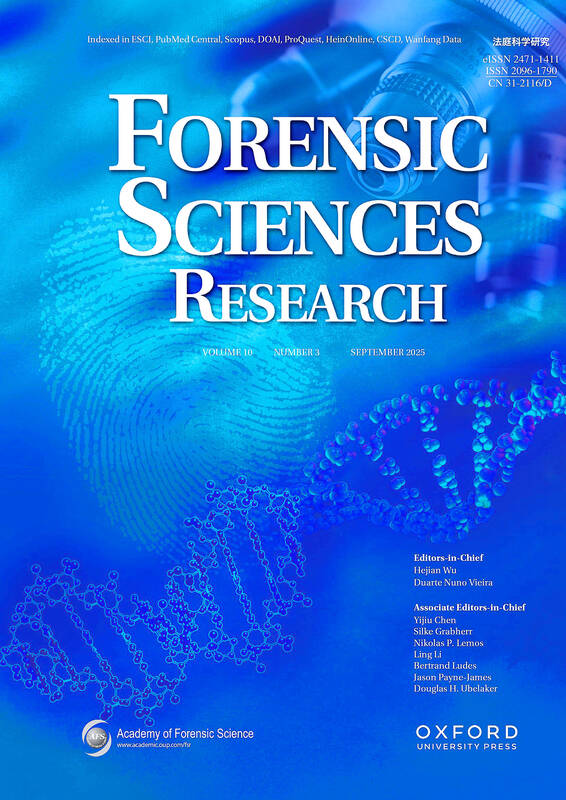Oxford University Press (OUP) will no longer publish a controversial academic journal sponsored by China’s Ministry of Justice after years of concerns that several papers in the publication did not meet ethical standards about DNA collection.
A statement published on the Web site of Forensic Sciences Research (FSR) states that OUP will stop publishing the quarterly journal after this year.
FSR is a journal that comes from China’s Academy of Forensic Science, an agency that sits under the Ministry of Justice. The academy describes FSR as “the only English quarterly journal in the field of forensic science in China that focuses on forensic medicine.” It has been published by OUP since 2023.

Photo: AP 照片:美聯社
Several papers published in FSR have attracted criticism because they study genetic data from Uighurs and other heavily surveilled ethnic minorities in China. Critics say subjects in the studies may not have freely consented to their DNA samples being used in the research and that the studies could help to enhance the mass surveillance of those populations.
One study, published in 2020, analyzed blood samples from 264 Uighurs in Urumqi, the capital of the Xinjiang region in north-west China. The paper states that the people giving the samples consented to the research and that their data was anonymized.
The lead author on the study is affiliated with China’s state security apparatus via the Xinjiang Police College, which provided a research grant.

Photo: Screen grab from Forensic Sciences Research’s Web site 照片:擷圖自《法庭科學研究》期刊網站
Two other papers published in FSR based on DNA samples from Chinese populations have been retracted by OUP since 2023 because of ethical concerns. In both cases, several of the researchers came from Chinese police authorities.
Forensic science research is often carried out under the auspices of police authorities, but in China, where there the state security apparatus is not subject to checks and balances, there is concern this kind of research may not meet international ethical standards.
Uighurs in Xinjiang are subject to intense surveillance by state authorities and between 2016 and 2018 about a million of them are estimated to have been detained in what China calls “vocational training centers.” The UN said China’s policies in Xinjiang could constitute crimes against humanity. There are also reports of Xinjiang authorities collecting DNA samples from millions of Uighurs under the guise of health checks, but which Uighurs and human rights groups have said are compulsory and designed to enhance surveillance.
Yves Moreau, a professor of engineering at the University of Leuven in Belgium who focuses on DNA analysis, first raised concerns about OUP’s relationship with FSR and about several studies. He said he was grateful for OUP’s decision but that the brief public statement on the matter “fails to address the important issues at stake.”
OUP acquired the journal in 2023. Under the terms of the publishing agreement between OUP and the Academy of Forensic Sciences, a copy of which was seen by the Guardian, the deal gave OUP the right to solicit paid advertisers in the pages of the journal. The agreement also gives OUP the right to collect any revenues received by the Academy of Forensic Sciences related to the journal.
In recent years there has been increasing scrutiny about the ethical standards of genetic research papers from China. Last year, a genetics journal from a leading scientific publisher retracted 18 papers from China due to concerns about human rights.
The concerns center on whether or not vulnerable populations in China can freely refuse to participate, especially when researchers come from organizations, such as the police, affiliated with state security. There are also concerns that this kind of forensic DNA sampling could produce research that enhances the mass surveillance of those populations.
(The Guardian)
牛津大學出版社(Oxford University Press,簡稱OUP)宣布,將停止出版一份由中國司法部贊助、長期備受爭議的學術期刊,原因是該期刊有多篇論文涉及的DNA樣本,其採集不符倫理規範,引發外界關切。
該期刊《法庭科學研究》(Forensic Sciences Research,簡稱FSR)在其網站發布聲明稱,牛津大學出版社將於今年底終止出版這本季刊。
《法庭科學研究》由隸屬中國司法部的中國司法鑑定科學研究院主辦,該院自稱此期刊是「中國唯一聚焦於法醫學領域的英文季刊」。該期刊自2023年起由牛津大學出版社出版。
《法庭科學研究》刊出的多篇論文因採用維吾爾族及其他在中國受嚴密監控之少數民族的遺傳資料而遭批評。外界批評,這些研究對象可能並未出於自願同意將其DNA樣本用於研究,而這些研究成果可能進一步加強對這些族群的大規模監控。
其中一篇發表於2020年的研究,分析採自新疆首府烏魯木齊的264名維吾爾人的血液樣本。該論文聲稱受試者已同意參與研究,且資料經過匿名處理。
該論文的第一作者隸屬於新疆警察學院,該機構亦提供研究經費,其背景與中國國安體系有關。
自2023年以來,牛津大學出版社已因倫理問題撤下另外兩篇發表在《法庭科學研究》、基於中國人群DNA樣本的論文,這兩篇論文的多位作者均來自中國公安部門。
雖然司法鑑定科學研究常由警方系統主導,但在中國,國安系統缺乏監督與制衡,令國際社會質疑此類研究是否符合國際倫理標準。
新疆的維吾爾族受到國家當局的嚴密監控。據估計,在2016至2018年間,約有一百萬人被關押在中國所謂的「職業技能教育培訓中心」。聯合國表示,中國在新疆的政策可能構成「危害人類罪」。另有通報稱,新疆當局以健康檢查名義採集數百萬維吾爾人的DNA樣本,但維吾爾族人及多個人權組織指出,樣本採集是強制性的,目的在於加強監控。
率先對牛津大學出版社與《法庭科學研究》的合作以及多篇研究論文表達疑慮的,是專精於DNA分析的比利時魯汶大學工程學教授伊夫·莫羅。他對牛津大學出版社的決定表示感謝,但也批評其簡短的公開聲明「未能觸及關鍵問題」。
根據英國《衛報》取得的一份出版協議副本,牛津大學出版社是在2023年取得該期刊的出版權。協議允許牛津大學出版社在期刊版面上招攬付費廣告,並有權收取與該刊有關的所有收益,包括來自中國司法鑑定科學研究院的收入。
近年來,來自中國的遺傳學研究論文面臨了日益嚴格的倫理審查。去年,一本知名學術出版社旗下的遺傳學期刊因人權疑慮撤下了18篇來自中國的論文。
外界主要關注的問題是,在中國,弱勢族群是否有真正自由的選擇權拒絕參與研究,特別是當研究人員是警察等隸屬於國安部門的單位時。此外,這類法醫DNA採樣的研究成果可能有助強化群體監控,進一步加劇人權問題。
(台北時報林俐凱編譯)

A: Apart from megahit “KPop Demon Hunters,” what else is worth watching? B: The new shows featuring four top-tier actors – Xiao Zhan, Wang Yibo, Yang Yang and Li Xian — are all popular. A: Yang’s TV drama, “The Immortal Ascension,” is definitely one of the summer sizzlers. Some praise it as the Eastern edition of the glorious “Harry Potter” series. B: Yeah, the costume fantasy drama is about a young man’s journey to immortality. All the magic powers and magical tools in the show are just stunning. A: Let me go stream it now. I wanna

A: Wow, animated fantasy film “KPop Demon Hunters” (KDH) has become Netflix’s most viewed film ever. B: Isn’t that the movie about a K-pop girl group secretly serving as demon hunters? A: Yeah, and its theme song “Golden” was No. 1 on the Billboard chart. B: The hit performed by HUNTR/X — the girl group from KDH — has inspired a “Golden challenge,” as celebrities are racing to cover its sky-high notes. A: Cool, let’s try it out. A: 哇,動畫電影《KPop獵魔女團》近日已成為網飛上觀看次數最多的電影。 B: 這部電影不是關於某韓流女團,成員秘密擔任惡魔獵人的故事? A: 對,主題曲《Golden》更勇奪告示牌單曲榜冠軍呢! B: 該曲由電影中的女團「HUNTR/X」所演唱,甚至還掀起一股全球《Golden》大挑戰︰一堆名人挑戰翻唱該曲飆高音。 A: 酷喔我們也來挑戰吧。(By Eddy Chang, Taipei Times/台北時報張迪)

An automated human washing machine was one of the highlights at the Osaka Kansai Expo, giving visitors a glimpse into the future of personal hygiene technology. As part of the event, 1,000 randomly selected visitors were given the chance to try out this cleansing system. The machine operates as a capsule-like chamber where warm water filled with microscopic bubbles gently washes away dirt. The 15-minute process also includes a drying phase, removing the need for users to dry themselves manually. Equipped with advanced sensors, the device monitors the user’s biological data, such as their pulse, to adjust water temperature and other settings

Firefighters might face an increased risk of developing “glioma,” a type of brain cancer, due to certain chemicals encountered on the job. A recent study analyzed glioma cases and found clear connections between the genetic patterns of affected firefighters and their exposure to these harmful substances. The study found that firefighters exhibited significantly higher levels of specific mutational signatures in their glioma cells compared to individuals in other occupations. These signatures — unique patterns of genetic changes in DNA — help scientists trace the source of mutations. Earlier research has associated these mutations with certain chemicals found in fire